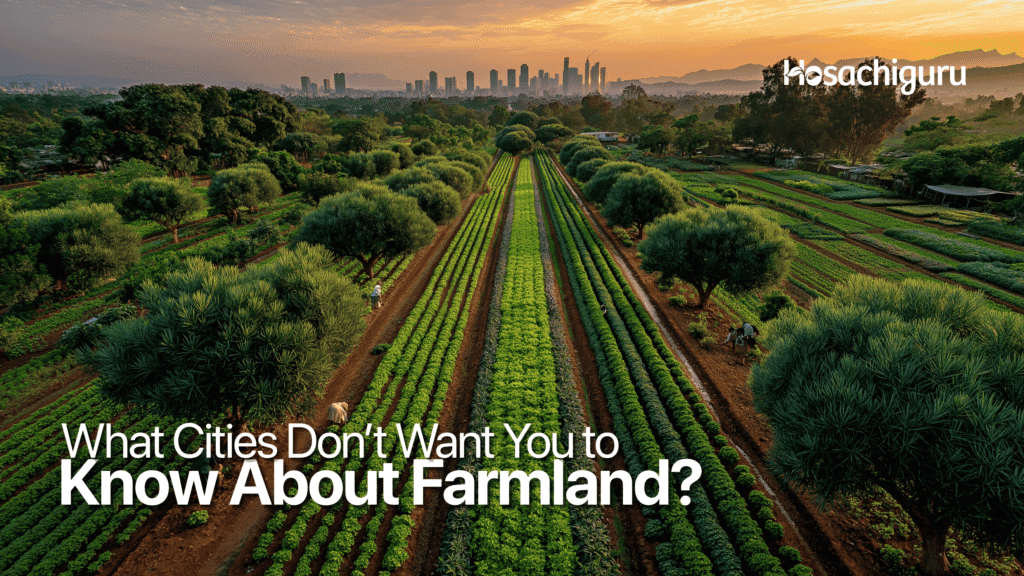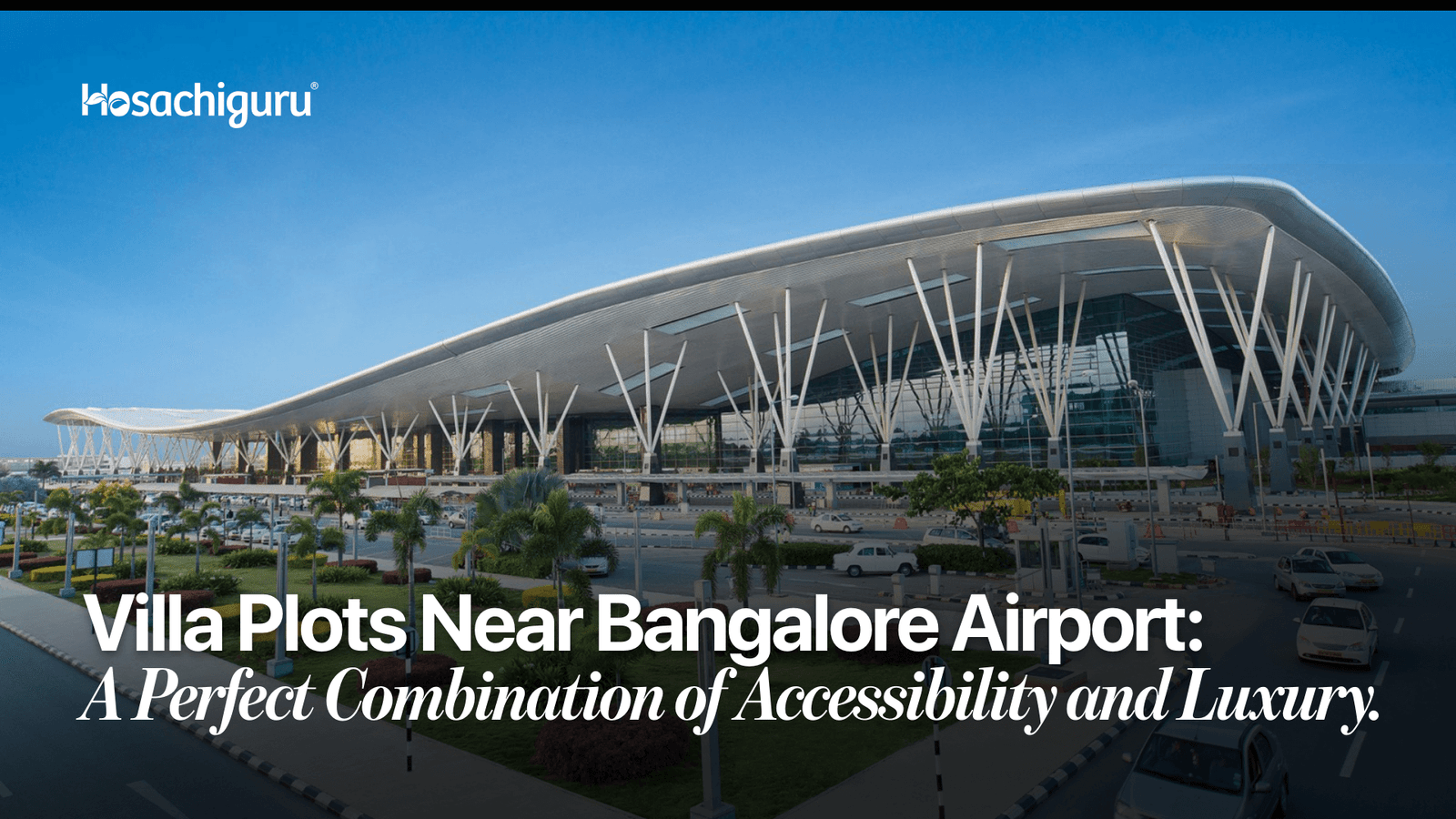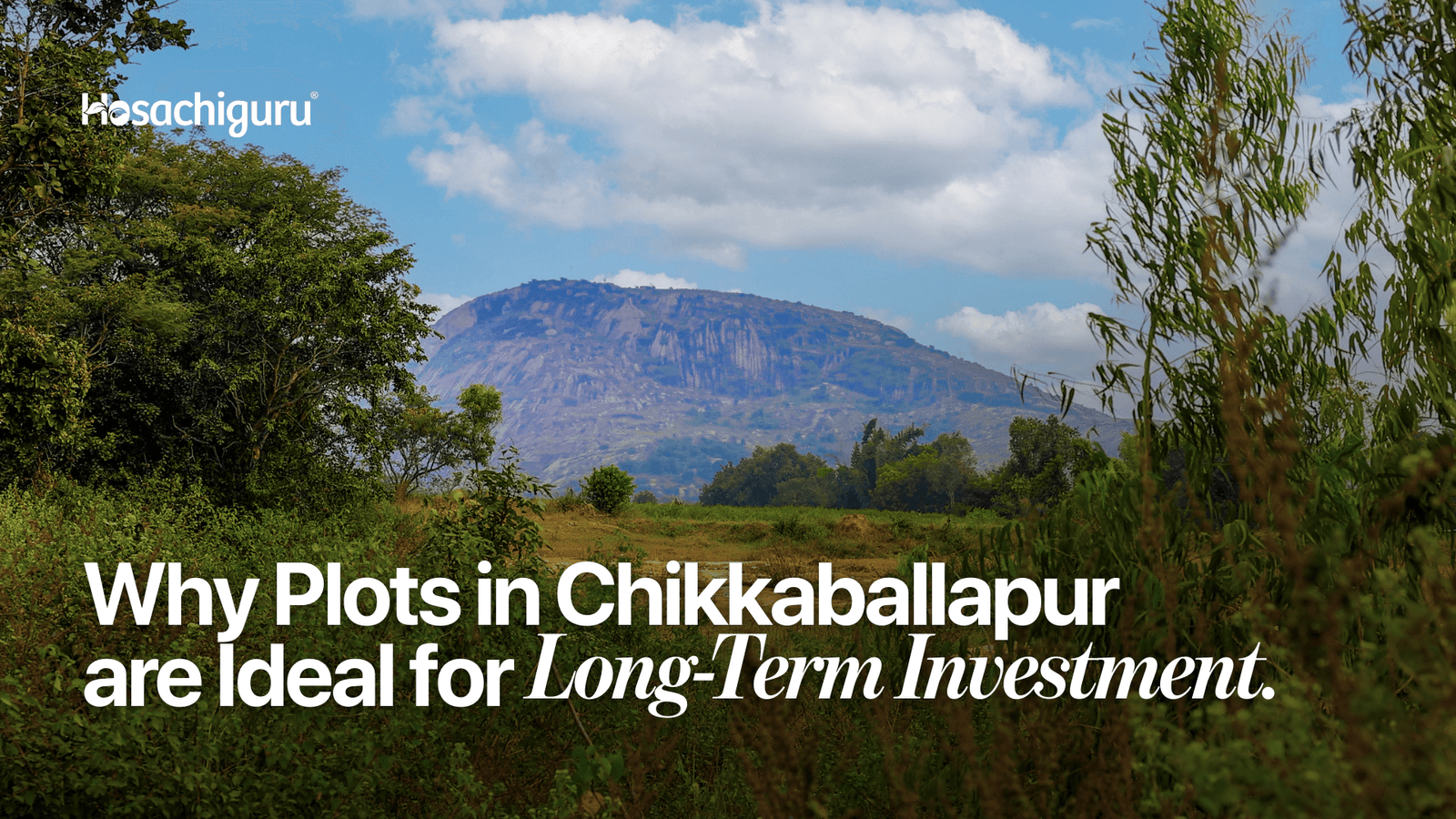What Cities Don’t Want You to Know About Farmland?
Let’s start with a phrase city ads love to throw at you: “Urban escape living.” You’ve seen it. Usually, it comes with a shiny tower, an infinity pool, and maybe a lonely potted palm pretending to be a forest. The implication? That you can live “close to nature” without leaving the city. But here’s the truth cities hope you ignore: the real escape isn’t a penthouse with a traffic view, it’s farmland near Bangalore.
Yes, farmland. The kind with actual trees, soil that breathes, and mornings where your alarm is a bird. And cities don’t want you thinking about it, because once you start comparing costs, mental health benefits, and post-retirement safety between city life and farmland benefits, suddenly, those glass towers don’t look so glamorous.
Bengaluru’s “Best Kept Secret”
Take Bengaluru in late 2025. The city is, let’s say, struggling. On September 18th, heavy overnight rain turned Electronic City flyover into a swimming pool. Cars stood like stranded ducks, traffic froze for hours. The silver lining? That same rain gave the city its best air quality of the month—an AQI of 46, classified as “Good.”
A few days earlier, from September 15–17, the Cauvery water supply was cut off for 60 hours for emergency repairs. Citizens had to store water like it was treasure. Paying top rupee for “urban luxury” and still spending evenings hauling buckets, hardly the life advertised in glossy brochures.
Meanwhile, the streets keep getting busier. In August alone, nearly 59,000 new vehicles were added, taking the city’s private vehicle count to over 10.6 million. Experts warn that Bengaluru may soon reach “permanent gridlock.” And with ~387,000 new residents last year and even more commuters from distant suburbs, rush-hour travel often takes 1 to 1.5 hours each way. That’s not just lost time, it’s stress, anxiety, and exhaustion.
And it’s not just the congestion. Even areas marketed as “quiet” are far from it. A 2025 noise survey found that “quiet zones,” like hospitals and schools, were buzzing at 60–64 decibels at night—where the legal limit is 40. Streets regularly reach 70–80 decibels. Chronic noise exposure is linked to stress, sleep disruption, and hypertension.
The Mental Health Toll
Remember Bengaluru’s “Garden City” nickname? Well, its green cover has fallen to less than 4%, and public space per person is only 2.2 square meters, far below the Indian norm of 10–12 m². Parks exist, yes, but mostly in older neighborhoods or national parks like Jakkur, Hebbal, and Bannerghatta. In new satellite townships, green spaces are either ornamental or missing entirely.
Unsurprisingly, mental health statistics reflect this environmental pressure. A 2024 survey found 90% of employees under 25 reported anxiety. By March 2025, over half of Karnataka’s employees admitted to burnout due to long hours, weekend work, and poor work-life balance. Long commutes were a major factor, hours spent in traffic directly raised stress levels and lowered motivation.
Now, compare this to a managed farmland near Bangalore. Imagine waking up to chirping birds, open skies, and soil that smells of life. Greenery lowers cortisol levels, fresh air improves sleep, and quiet mornings ease the mind. Farmland benefits are not just poetic, they are physiological. Your body responds, your mind relaxes, and your health gets a boost that no city spa can match.
Cost: The Hard Numbers
Let’s talk about money, because this is where cities really don’t want you to pay attention. A two-bedroom apartment in Bengaluru can easily cost upwards of 1 crore, plus maintenance, and a bunch of routine overheads. Then there’s electricity, security, and the hidden costs of stress-related health issues.
Compare that to investing in farmland near Bangalore. For much less, you get land that feeds you, trees that cool you, and soil that appreciates in value over time. Unlike apartments, farmland doesn’t depreciate when paint peels or pipes leak. You also get tangible returns, fresh produce, healthier air, and a safer post-retirement life. Farmland is quietly becoming the retirement plan of choice for people who want a secure, sustainable, and stress-free lifestyle.
It’s worth noting: the city’s so-called “luxury lifestyle” is essentially renting stress in a shiny container. Farmland gives you the long-term equity of health, calm, and independence. The math is simple, even if city marketing prefers it hidden.
Post-Retirement Safety: Beyond Guards and Cameras
Cities like to claim high-rises are “safe” with guards, CCTV, and security systems. But concrete can’t protect you from aging infrastructure, power cuts, water shortages, or rising medical costs, things that hit retirees hardest. And let’s not even mention emergency access when traffic is at a standstill.
Now imagine a different kind of safety: farm plots. Managed farms, natural fencing, and community support create a real sense of security. Managed Farmland companies like Hosachiguru combine sustainable farming with smart community design. It’s a life where you’re not isolated, but supported and surrounded by nature that cares for you as much as you care for it. That’s the kind of safety which is more valuable than any guarded gate.
Owning Farmland also gives you flexibility after retirement. You control your ecosystem—your soil, your plantations, your environment and the developer supports you by helping you maintain and enhance your plants and crops.
Health: More Than Fitness Apps
Urban wellness culture has a funny contradiction. Cities sell yoga, meditation, and smoothie bowls, while simultaneously stripping away the natural benefits that make those practices effective. Less greenery, more noise, poor air quality, these factors can cancel out even the best wellness routine.
In contrast, farmland living promotes health without gimmicks. Walking through your own fields counts as exercise. Breathing clean air improves lung function. Growing your own vegetables ensures fresh, pesticide-free produce. Even simple exposure to green spaces reduces stress, improves mood, and boosts cognitive function. That’s urban escape living done properly, without waiting for a weekend or a vacation.
Hosachiguru exemplifies this approach, offering managed farmland near Bangalore where health, calm, and community are built into the design. Here, nature is the foundation.
The Real “Urban Escape Living”
Cities love to sell “urban escape living” inside the city. Rooftop gardens, infinity pools, ornamental greenery, they’re supposed to mimic nature. But the real benefits lie outside concrete walls. Farmland near Bangalore gives you fresh vegetables from your own soil, walks among pollinator gardens instead of fumes, and sleep broken only by birds, not honking.
It’s also a lifestyle upgrade for families. Children grow up understanding food, nature, and seasons. Adults experience lower stress and more energy. Retirees find safety, calm, and self-sufficiency. Farmland benefits are holistic, unlike the compartmentalized perks of city life.
What Cities Don’t Want You to Think About
If you remove the billboards and brochures, the truth is simple: the city fears that you’ll realize – “why am I paying so much to live stressed.” Once you compare costs, mental wellness, and retirement security, the city’s “luxury lifestyle” starts looking like a bad deal.
The untold truth is this: the life worth glorifying isn’t battling traffic, noise, and water shortages. It’s breathing, growing, and thriving. Farmland near Bangalore gives you all that, plus freedom
from urban chaos. It’s the plot twist no one tells you about, but once you see it, there’s no going back.
And here’s the twist: managed farmlands like Hosachiguru aren’t just about plots of land. We integrate modern convenience with regenerative practices, safe communities, and access to apps
like “MyFarm App” that keep you updated about your farm, even from the city. You can monitor crops, soil health, and water levels, all without sacrificing peace of mind. That’s urban escape living that actually works.
Why the Farm Life Should Be Glorified
So, next time you see a billboard shouting about rooftop gardens and infinity pools, remember: those are just props. The real lifestyle worth celebrating is the one where mornings smell like wet soil, afternoons are shaded by trees, and evenings bring quiet. Farmland benefits include mental wellness, financial sense, and post-retirement security. It’s tangible, reliable, and restorative.
Cities want you to chase the illusion of comfort while paying for stress. Farms give you actual comfort, calm, and control. It’s not just about luxury, it’s about living well. And if you’re looking for farmland near Bangalore that blends sustainability, safety, and ease, Hosachiguru is leading the way. Because sometimes the most rebellious thing you can do is leave the city, not in anger, but in pursuit of life that actually nourishes you.

 30 Sep 2025
30 Sep 2025  8 Min
8 Min


